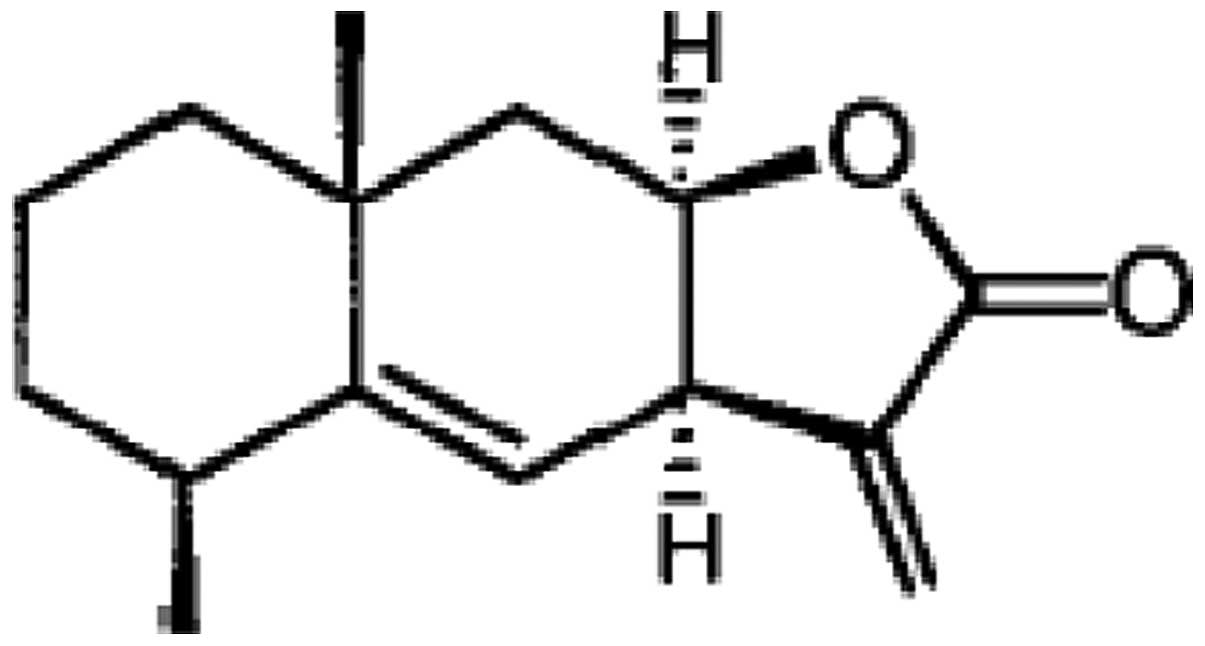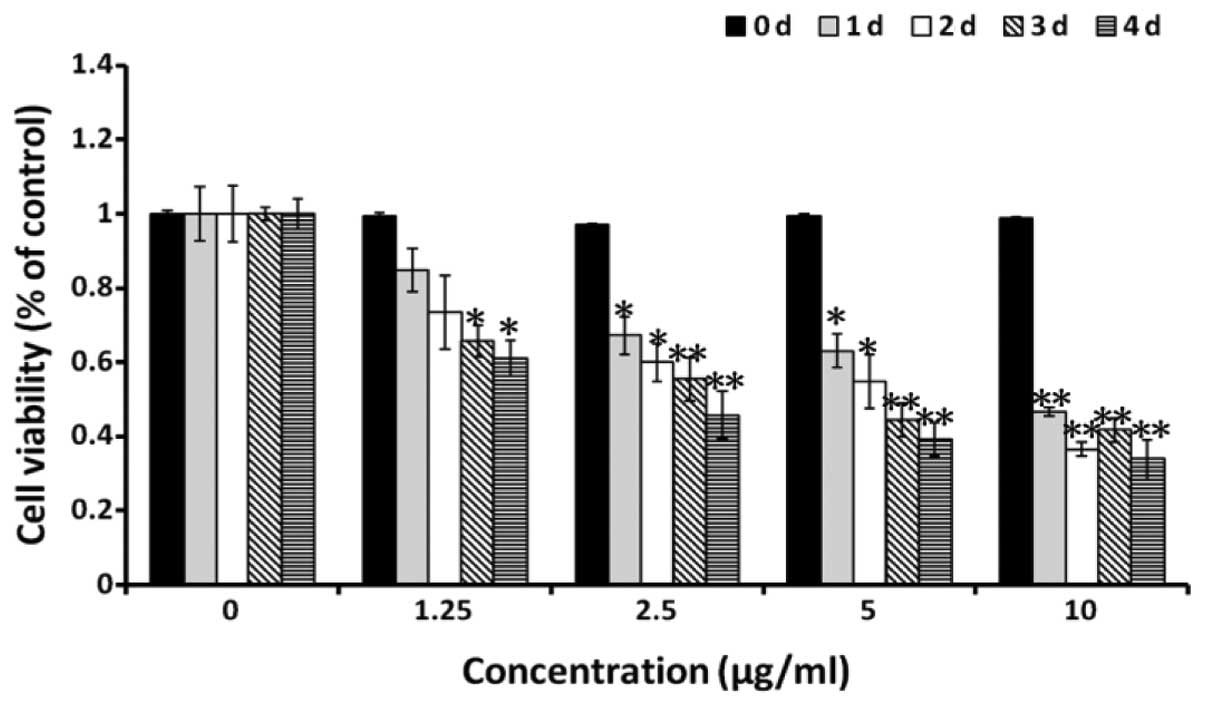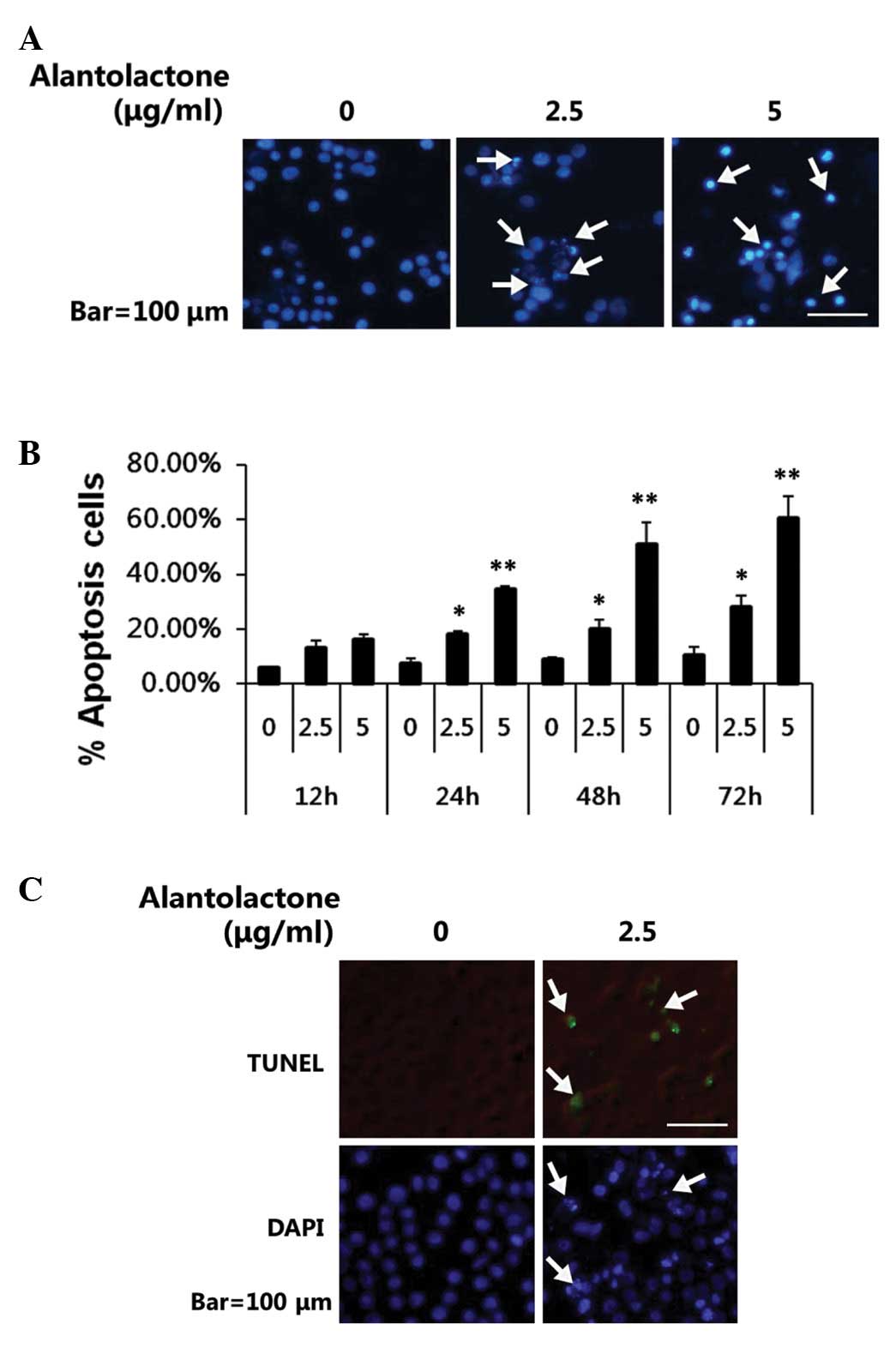|
1
|
Jemal A, Murray T, Ward E, et al: Cancer
statistics, 2005. CA Cancer J Clin. 55:10–30. 2005. View Article : Google Scholar
|
|
2
|
Gustin DM and Brenner DE: Chemoprevention
of colon cancer: current status and future prospects. Cancer
Metastasis Rev. 21:323–348. 2002. View Article : Google Scholar : PubMed/NCBI
|
|
3
|
Fauzi AN, Norazmi MN and Yaacob NS:
Tualang honey induces apoptosis and disrupts the mitochondrial
membrane potential of human breast and cervical cancer cell lines.
Food Chem Toxicol. 49:871–878. 2011. View Article : Google Scholar : PubMed/NCBI
|
|
4
|
Hsu HF, Houng JY, Kuo CF, Tsao N and Wu
YC: Glossogin, a novel phenylpropanoid from Glossogyne
tenuifolia, induced apoptosis in A549 lung cancer cells. Food
Chem Toxicol. 46:3785–3791. 2008.PubMed/NCBI
|
|
5
|
Luo M, Liu X, Zu Y, et al: Cajanol, a
novel anticancer agent from Pigeonpea [Cajanus cajan (L.)
Millsp] roots, induces apoptosis in human breast cancer cells
through a ROS-mediated mitochondrial pathway. Chem Biol Interact.
188:151–160. 2010.PubMed/NCBI
|
|
6
|
Cantrell CL, Abate L, Fronczek FR, et al:
Antimycobacterial eudesmanolides from Inula helenium and
Rudbeckia subtomentosa. Planta Med. 65:351–355. 1999.
View Article : Google Scholar
|
|
7
|
Konishi T, Shimada Y, Nagao T, Okabe H and
Konoshima T: Antiproliferative sesquiterpene lactones from the
roots of Inula helenium. Biol Pharm Bull. 25:1370–1372.
2002. View Article : Google Scholar : PubMed/NCBI
|
|
8
|
Dirsch VM, Stuppner H and Vollmar AM:
Cytotoxic sesquiterpene lactones mediate their death-inducing
effect in leukemia T cells by triggering apoptosis. Planta Med.
67:557–559. 2001. View Article : Google Scholar : PubMed/NCBI
|
|
9
|
Lawrence NJ, McGown AT, Nduka J, Hadfield
JA and Pritchard RG: Cytotoxic Michael-type amine adducts of
alpha-methylene lactones alantolactone and isoalantolactone. Bioorg
Med Chem Lett. 11:429–431. 2001. View Article : Google Scholar : PubMed/NCBI
|
|
10
|
Shi Y, Bao YL, Wu Y, et al: Alantolactone
inhibits cell proliferation by interrupting the interaction between
Cripto-1 and activin receptor type II A in activin signaling
pathway. J Biomol Screen. 16:525–535. 2011. View Article : Google Scholar : PubMed/NCBI
|
|
11
|
Bellamy CO, Malcomson RD, Harrison DJ and
Wyllie AH: Cell death in health and disease: the biology and
regulation of apoptosis. Semin Cancer Biol. 6:3–16. 1995.
View Article : Google Scholar : PubMed/NCBI
|
|
12
|
Reed JC: Apoptosis-regulating proteins as
targets for drug discovery. Trends Mol Med. 7:314–319. 2001.
View Article : Google Scholar : PubMed/NCBI
|
|
13
|
Kaufmann SH, Kottke TJ, Martins LM,
Henzing AJ and Earnshaw WC: Analysis of caspase activation during
apoptosis. Curr Protoc Cell Biol. Chapter 18(Unit 18):
22001.PubMed/NCBI
|
|
14
|
Danial NN and Korsmeyer SJ: Cell death:
critical control points. Cell. 116:205–219. 2004. View Article : Google Scholar : PubMed/NCBI
|
|
15
|
Murphy KM, Ranganathan V, Farnsworth ML,
Kavallaris M and Lock RB: Bcl-2 inhibits Bax translocation from
cytosol to mitochondria during drug-induced apoptosis of human
tumor cells. Cell Death Differ. 7:102–111. 2000. View Article : Google Scholar : PubMed/NCBI
|
|
16
|
Chatterjee S, Kundu S and Bhattacharyya A:
Mechanism of cadmium induced apoptosis in the immunocyte. Toxicol
Lett. 177:83–89. 2008. View Article : Google Scholar
|
|
17
|
Pathak N and Khandelwal S: Role of
oxidative stress and apoptosis in cadmium induced thymic atrophy
and splenomegaly in mice. Toxicol Lett. 169:95–108. 2007.
View Article : Google Scholar : PubMed/NCBI
|
|
18
|
Martindale JL and Holbrook NJ: Cellular
response to oxidative stress: signaling for suicide and survival. J
Cell Physiol. 192:1–15. 2002. View Article : Google Scholar : PubMed/NCBI
|
|
19
|
Zhou YJ, Zhang SP, Liu CW and Cai YQ: The
protection of selenium on ROS mediated-apoptosis by mitochondria
dysfunction in cadmium-induced LLC-PK(1) cells. Toxicol In Vitro.
23:288–294. 2009. View Article : Google Scholar : PubMed/NCBI
|
|
20
|
Yang JS, Chen GW, Hsia TC, et al: Diallyl
disulfide induces apoptosis in human colon cancer cell line (COLO
205) through the induction of reactive oxygen species, endoplasmic
reticulum stress, caspases casade and mitochondrial-dependent
pathways. Food Chem Toxicol. 47:171–179. 2009. View Article : Google Scholar
|
|
21
|
Wei A, Zhou D, Xiong C, Cai Y and Ruan J:
A novel non-aromatic B-ring flavonoid: isolation, structure
elucidation and its induction of apoptosis in human colon HT-29
tumor cell via the reactive oxygen species-mitochondrial
dysfunction and MAPK activation. Food Chem Toxicol. 49:2445–2452.
2011. View Article : Google Scholar
|
|
22
|
Wang L, Xu ML, Hu JH, Rasmussen SK and
Wang MH: Codonopsis lanceolata extract induces G0/G1 arrest
and apoptosis in human colon tumor HT-29 cells - involvement of ROS
generation and polyamine depletion. Food Chem Toxicol. 49:149–154.
2011. View Article : Google Scholar
|
|
23
|
Zhou L, Bao YL, Zhang Y, et al: Knockdown
of TSP50 inhibits cell proliferation and induces apoptosis in P19
cells. IUBMB Life. 62:825–832. 2010. View
Article : Google Scholar : PubMed/NCBI
|
|
24
|
Zhang Y, Zhou L, Bao YL, et al: Butyrate
induces cell apoptosis through activation of JNK MAP kinase pathway
in human colon cancer RKO cells. Chem Biol Interact. 185:174–181.
2010. View Article : Google Scholar : PubMed/NCBI
|
|
25
|
Rizzuto R, Nakase H, Darras B, et al: A
gene specifying subunit VIII of human cytochrome c oxidase is
localized to chromosome 11 and is expressed in both muscle and
non-muscle tissues. J Biol Chem. 264:10595–10600. 1989.PubMed/NCBI
|
|
26
|
Zafarullah M, Li WQ, Sylvester J and Ahmad
M: Molecular mechanisms of N-acetylcysteine actions. Cell Mol Life
Sci. 60:6–20. 2003. View Article : Google Scholar
|
|
27
|
Rego AC and Oliveira CR: Mitochondrial
dysfunction and reactive oxygen species in excitotoxicity and
apoptosis: implications for the pathogenesis of neurodegenerative
diseases. Neurochem Res. 28:1563–1574. 2003. View Article : Google Scholar : PubMed/NCBI
|
|
28
|
Shen Z, Shen J, Chen M, Li Q and Hong C:
Morphological changes of mitochondria in apoptosis of esophageal
carcinoma cells induced by As(2)O(3). Zhonghua Bing Li Xue Za Zhi.
29:200–203. 2000.(In Chinese).
|
|
29
|
Gryfe R, Swallow C, Bapat B, et al:
Molecular biology of colorectal cancer. Curr Probl Cancer.
21:233–300. 1997. View Article : Google Scholar
|
|
30
|
Sadowska AM, Manuel Y-Keenoy B and De
Backer WA: Antioxidant and anti-inflammatory efficacy of NAC in the
treatment of COPD: discordant in vitro and in vivo dose-effects: a
review. Pulm Pharmacol Ther. 20:9–22. 2007. View Article : Google Scholar : PubMed/NCBI
|
|
31
|
Budihardjo I, Oliver H, Lutter M, Luo X
and Wang X: Biochemical pathways of caspase activation during
apoptosis. Annu Rev Cell Dev Biol. 15:269–290. 1999. View Article : Google Scholar : PubMed/NCBI
|
|
32
|
Kroemer G and Martin SJ:
Caspase-independent cell death. Nat Med. 11:725–730. 2005.
View Article : Google Scholar : PubMed/NCBI
|
|
33
|
Adams JM and Cory S: The Bcl-2 protein
family: arbiters of cell survival. Science. 281:1322–1326. 1998.
View Article : Google Scholar : PubMed/NCBI
|
|
34
|
Yin XM: Signal transduction mediated by
Bid, a pro-death Bcl-2 family proteins, connects the death receptor
and mitochondria apoptosis pathways. Cell Res. 10:161–167. 2000.
View Article : Google Scholar : PubMed/NCBI
|
|
35
|
Nomura M, Shimizu S, Ito T, et al:
Apoptotic cytosol facilitates Bax translocation to mitochondria
that involves cytosolic factor regulated by Bcl-2. Cancer Res.
59:5542–5548. 1999.PubMed/NCBI
|




















